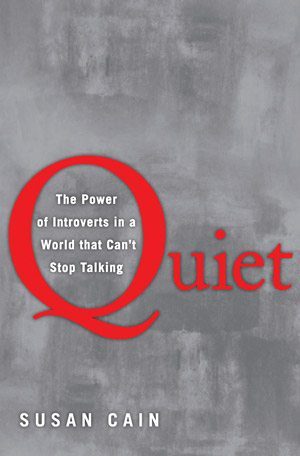Do you ever feel that people are trying to give you a hint?
This past Christmas, my family gave me a couple books (not unusual), and the titles seemed to be a not-so-subtle plea: When Words Matter Most (not sure of the author) and Quiet by Susan Cain. Hmm, I thought, that can’t be a coincidence. My family doesn’t give gifts at random.
I’ve always been quiet- one of my teachers wrote in a college recommendation that I was “painfully shy.” It’s not as if it was news to anyone (least of all myself), and it’s something that I have to work at every day. But, to be honest, I’m just throwing punches in the dark, trying to change my personality and the way I’m fundamentally wired in order to become this “better” thing: an extrovert. It turns out, Quiet is one of the most helpful books I’ve ever read from a personal and professional standpoint.
Quiet explores behavioral, psychological and physiological differences between introverts and extroverts (most of which seems like common knowledge, but there are some interesting . She also makes some important clarifications, for instance being an introvert doesn’t make you shy or sensitive, although you’re more likely to be one or both. This book isn’t about “finding yourself” or “coping with you introversion.” It does offer some insight about different personalities, and, from my point of view, empowers readers to find out what they need. Here’s what I’ve learned so far from being quiet:
1. Speaking May Never Get Easier. I’m never going to be comfortable with public or impromptu speaking. And I’m okay with that. That’s not to say I’ll never run a meeting, give a presentation, or do another Tech Thursday video. It just means going about it in a different, more comfortable way. One example: for many of our Tech Thursday videos, if I didn’t mentally or physically have an outline of the subject matter, I blanked out in front of the camera (my brother calls this my “freeze”- rather than fight or flight, I have a third reaction based on the deer in the headlights model). Although I’d grown used to the camera, there was still something short-circuiting in my brain when that little red “Recording” light came on.
Introverted people are more likely to get overstimulated, especially in situations such as public speaking or talk. And, oftentimes, they’ll end up leaving a presentation thinking “Man, I sounded dumb,” or “Oh SNAP, I forgot this one huge point (or five little points)!” As it turns out, that’s not uncommon: “Overarousal interferes with attention and short term memory- key components of the ability to speak on the fly” (126). The key is finding out what does work. This may mean preparation well in advance, a brief meditation beforehand- whatever helps you get in the zone.
2. Finding Your Balance. Some people do their best work alone, some require more stimulation, and others need a mix. There’s a certain level of self-awareness involved here. Personally, I’ve found that although I enjoy having a quiet space to get work done solo, I need to interact with other people (usually, asking Nicole for feedback on something, or collaborating with others on a project). Sometimes it’s going to a Business After Hours. Even though meetings and presentations to a certain extent terrify me, I go back to my quiet desk-space with a new energy that propels whatever I’m working on privately (and I’m fortunate enough to have a job that allows me to do both).
If you’re the type of person who will die of thirst before risking small talk at the water cooler, chances are you aren’t going to do your best work in an office with an open-floor plan and constant drop-ins. However, if you are the guy glued to the water cooler, chances are you aren’t going to want to work in isolation for hours on end. Finding out how you work best could yield some amazing results. Who knows- you could be the next Einstein…
3. It’s not a matter of better vs. worse, good vs. bad, or any of those opposite pairings (which is what I was expecting). For the longest time, I convinced myself that being quiet was “bad” and that I needed to talk more to be a better person. Quiet is a way to determine whether you identify as an introvert, extrovert, or both, without assigning judgement. Everything has strengths and weaknesses. This book was eye-opening for me in terms of playing up my strengths (patience, empathy, listening) in my professional life, and stress less about becoming something I’m not (a toned-down version of Billy Mays, maybe), especially regarding my professional development.
So, if you’re looking for a good read (or want to explore the world of introversion), check out Quiet. Worst case, you learn something you didn’t know before, like what happens to introverted fish in an unfamiliar pond (this isn’t a metaphor- there was literally a fish in a pond study in this book).
And, if you’re not into the idea of committing to a book, Susan Cain gives a TED Talk on “The Power of Introverts” that you can check out, too.
Buy your copy of “Quiet” on Amazon (note: This is an affiliate link)

